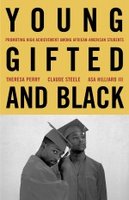
Keeping it Positive
Click here for an introduction to Positive Psychology
Positive Quotes
The difference between can and cannot are only three letters. Three letters that determine your life's direction.
Being positive or negative are habits of thoughts that have a very strong influence on life.
Positive and negative are directions. Which direction do you choose?
Positive thinking is expecting, talking and visualizing with certainty what you want to achieve, as an accomplished fact.
Riches, mediocrity and poverty begin in the mind.
Reality is the mirror of your thoughts. Choose well what you put in front of the mirror.
The mind is the decisive factor in your life, but who decides for the mind?
A positive attitude brings strength, energy and initiative.
To think negatively is like taking a weakening drug.
For more positive quotes click here
 A huge portion of the school reform debate in America-explicitly and implicitly—is framed around the success and failure of African-American children in school. The test-score "achievement gap" between white and black students, especially, is a driving and divisive issue. Yet the voices of prominent African-American intellectuals have been conspicuously left out of the debate about black children.
A huge portion of the school reform debate in America-explicitly and implicitly—is framed around the success and failure of African-American children in school. The test-score "achievement gap" between white and black students, especially, is a driving and divisive issue. Yet the voices of prominent African-American intellectuals have been conspicuously left out of the debate about black children.Young, Gifted, and Black sets out to reframe the terms of that debate. The authors argue that understanding how children experience the struggle of being black in America is essential to improving how schools serve them. click here for more information
Developing and Nurturing Excellence in Adolescent African American Males
The best chance of breaking these negative social and educational trends for adolescent African American males lies within the school environment and will require innovative strategies if the trend is to be reversed. Many educators, community leaders, and even some school systems believe that enrichment initiatives geared toward the special needs of young African-American males could reverse the present trend towards failure within the educational system as well as society (Johnson, 1990; Ascher, 1991). Depending on the racial break down of the student population, these enrichment initiatives over the past decade have resulted in significant changes to the curriculum and school mission or in the addition of special after school programs.
Click here for the article
African American Population
For the negative attention that African Americans recieve the numbers are embarrassing but for their contributions the numbers reflect a impressive people
The following gives the African American population in the U.S. over time, based on U.S. Census figures. (Numbers from years 1920 to 2000 are based on U.S. Census figures as given by the Time Almanac of 2005, p 377)
| Year | Number | Percentage of total population |
|---|---|---|
| 1790 | 757,208 | 19.3% (highest historic percentage) |
| 1800 | 1,002,037 | 18.9% |
| 1810 | 1,377,808 | 19.0% |
| 1820 | 1,771,656 | 18.4% |
| 1830 | 2,328,642 | 18.1% |
| 1840 | 2,873,648 | 16.8% |
| 1850 | 3,638,808 | 15.7% |
| 1860 | 4,441,830 | 14.1% |
| 1870 | 4,880,009 | 12.7% |
| 1880 | 6,580,793 | 13.1% |
| 1890 | 7,488,788 | 11.9% |
| 1900 | 8,833,994 | 11.6% |
| 1910 | 9,827,763 | 10.7% |
| 1920 | 10.5 million | 9.9% |
| 1930 | 11.9 million | 9.7% (lowest historic percentage) |
| 1940 | 12.9 million | 9.8% |
| 1950 | 15.0 million | 10.0% |
| 1960 | 18.9 million | 10.5% |
| 1970 | 22.6 million | 11.1% |
| 1980 | 26.5 million | 11.7% |
| 1990 | 30.0 million | 12.1% |
| 2000 | 36.6 million | 12.3% |
Source wikipedia
1 comment:
Who knows where to download XRumer 5.0 Palladium?
Help, please. All recommend this program to effectively advertise on the Internet, this is the best program!
Post a Comment